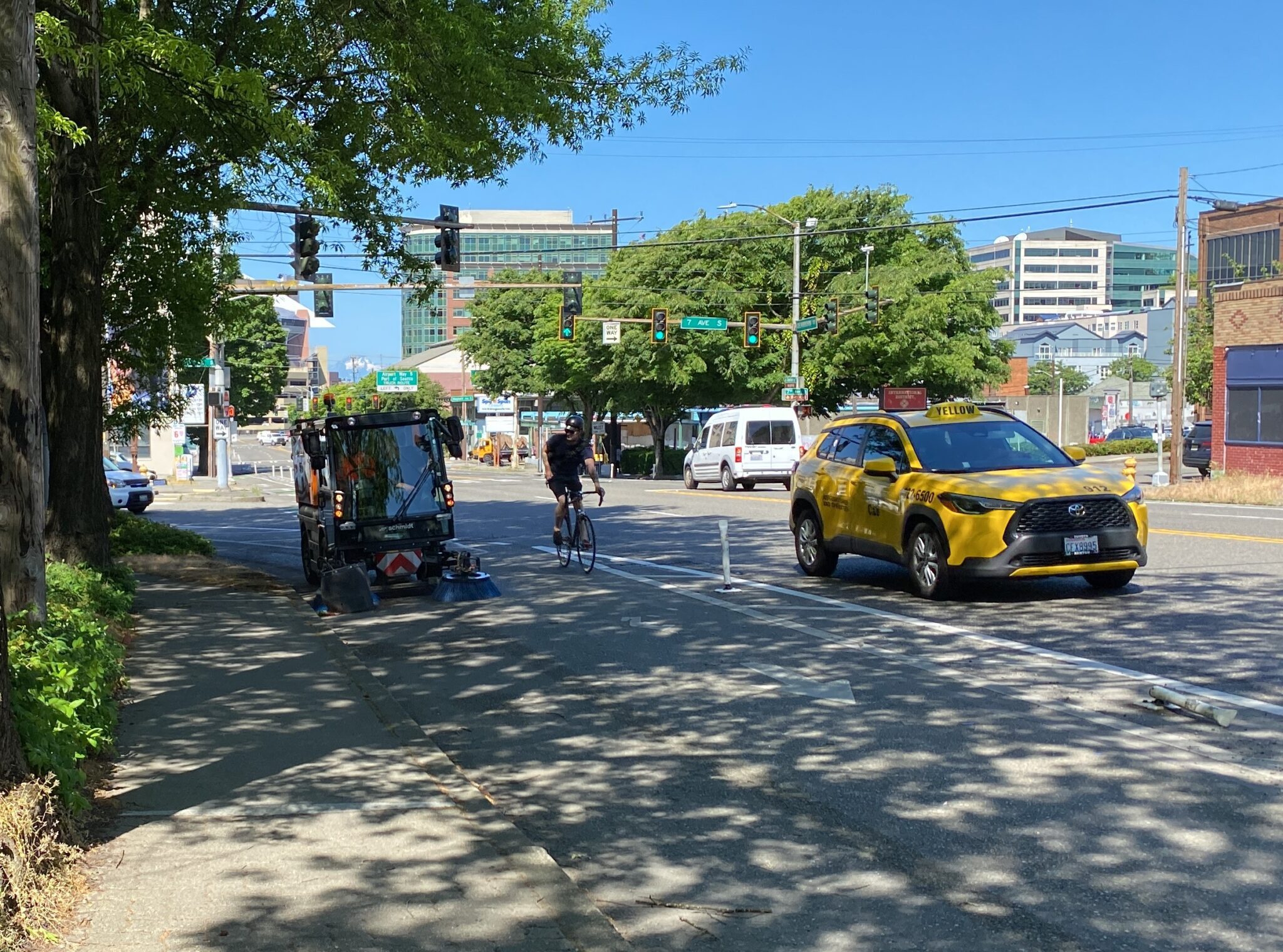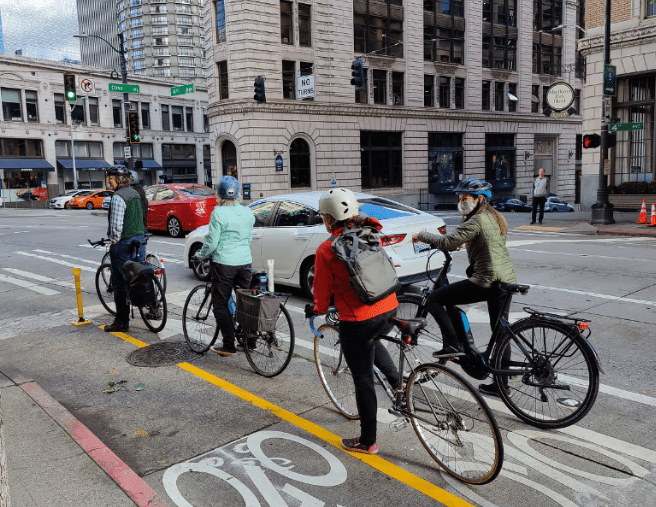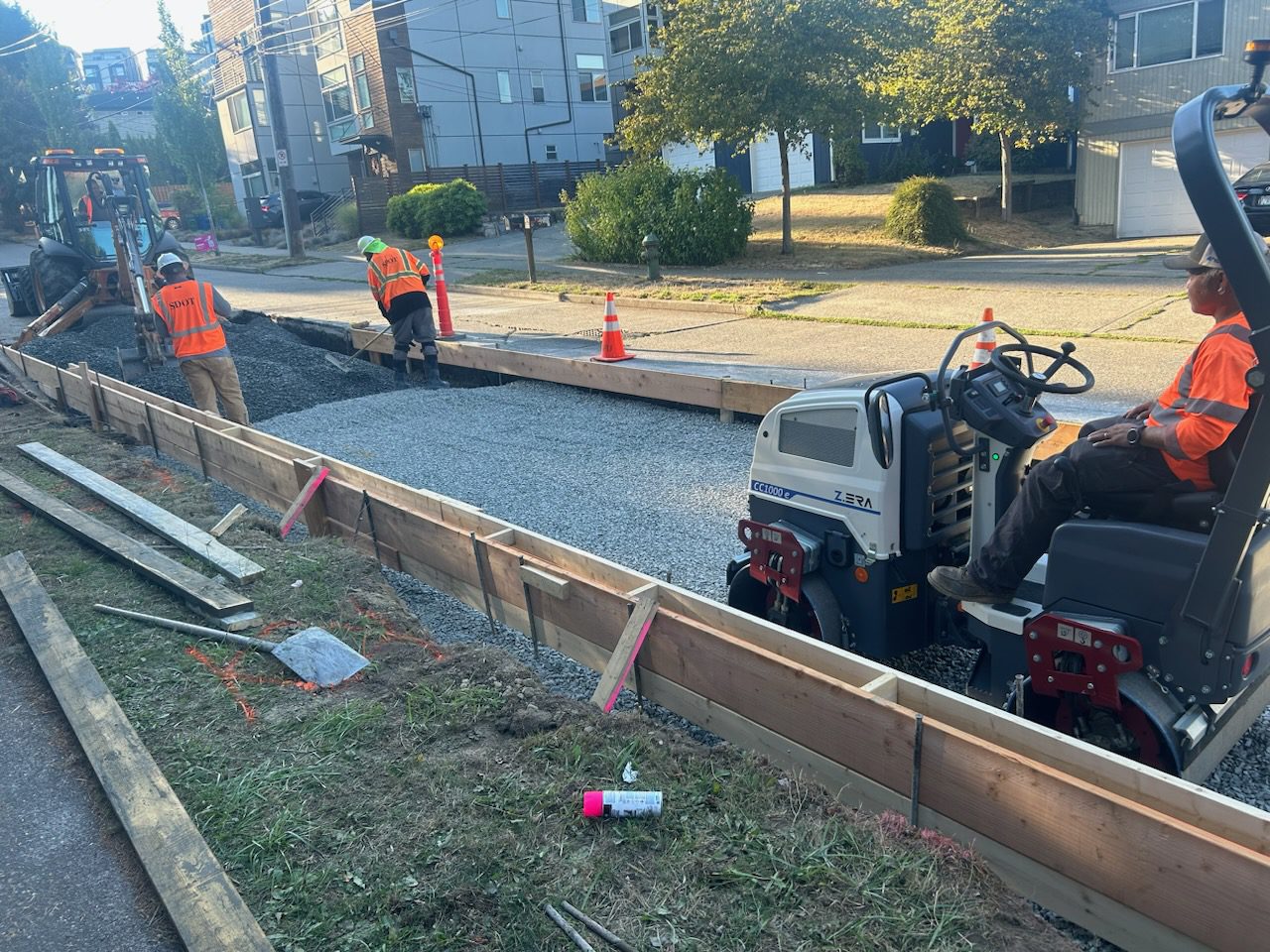 Pictured: eSwingo 200+ electric compact sweeper rented by SDOT. Photo Credit: SDOT.
Pictured: eSwingo 200+ electric compact sweeper rented by SDOT. Photo Credit: SDOT. Blog stats: 900 words | 6-minute read
Digest:
- Piloting the first electric bike lane sweeper: Following a successful test run of the eSwingo 200+, a fully electric compact sweeper by Schmidt, we rented one for six months to pilot its feasibility and durability in Seattle. This is the first electric protected bike lane (PBL) sweeper that SDOT is renting and testing, which will enable us to make an informed purchasing decision in the future.
- Right size, then electrify: We’ll conduct four to six pilot projects in 2023 and 2024 to test operating new electric vehicles and equipment. These vehicles will help with a wide range of efforts, which may include street sweeping, bike lane inspections and spot repairs, and potentially other construction tasks.
- Meeting crucial climate goals: This effort advances the actions set in Mayor Harrell’s 2022 Transportation and Climate Justice Executive Order, including the goal to achieve a 100% zero-emission, fossil fuel-free City fleet by 2030.
We’re launching the eBroomer Pilot Program – our first demonstration project to test the durability and feasibility of replacing SDOT’s carbon emitting fleet of vehicles with zero-emissions alternatives.
In June 2023, we tested the eSwingo 200+, a fully electric compact sweeper by Schmidt. Following successful tests, we rented one of these units for six months, to pilot the feasibility of this machine’s use in Seattle. This is the first electric protected bike lane (PBL) sweeper that SDOT is renting and testing, which will enable us to make an informed purchasing decision in the future. This pilot program supports the City’s climate goals and progress towards achieving complete electrification of the City’s fleet by 2030, as laid out in Mayor Harrell’s 2022 Transportation and Climate Justice Executive Order.

The pilot program will test the functionality of the all-electric bike lane sweepers on the PBL network, including South Dearborn Street and 2nd Avenue. According to the manufacturer, the eSwingo can operate for ten hours on a single charge and requires eight hours to fully recharge. The eSwingo’s capacity ratings were developed on flat surfaces and roads, so one of SDOT’s goals is to determine the product’s operational capacity as it navigates the complex topography within Seattle. This will include assessments of the demand for sweeping, maintenance needs, charging time, charge hold, and durability in inclement weather. Additionally, the electric sweeper offers a quieter option for cleaning the city’s PBLs when compared to the traditional street sweepers SDOT has historically employed.

Most climate emissions in Seattle come from transportation, specifically short one to three-mile vehicle trips. Access to PBLs free of debris and leaves is a key strategy for reducing our city’s impact on the climate. This pilot is part of a program aimed at ensuring a safe and reliable zero emission alternative travel options year-round.
Right size, then electrify! We’ll conduct four to six pilot projects through 2024 to test operating new electric vehicles and equipment.

The Seattle Department of Transportation is on a mission to deliver a transportation system that provides safe and affordable access to places and opportunities.
“Seattle deserves a transportation system that works for all users, that supports a more healthy, sustainable, and equitable future. Electrifying the City’s fleet is one of the most actionable investments we can make to address our climate goals and SDOT’s eBroomer pilot is an important step. This pilot program brings us one step closer to achieving our One Seattle vision for a zero-emission, fossil fuel-free City fleet by 2030. Together, we’re forging a path towards a better future.”
– Mayor Bruce Harrell
“We at SDOT are committed to right sizing and electrifying our fleet of vehicles and equipment, to reduce carbon emissions from city operations. It’s part of our strategy to combat climate change and to efficiently maintain our city’s robust and growing network of bike facilities, transit priority lanes, and walking connections.”
– Greg Spotts, SDOT Director
“Our team is building on other cities’ experiences electrifying their fleets, including the City of Los Angeles, which made great strides under Greg Spotts’ leadership at StreetsLA. We’re excited to lead by example as we integrate zero emission vehicles and equipment into our crew members’ everyday maintenance, construction and operations work. This brings us one step closer to realizing Seattle’s goals for a more equitable, climate-resilient city for all.”
– Rodney Maxie, SDOT Deputy Director
“In alignment with Mayor Harrell’s Transportation and Climate Justice Executive Order, SDOT is taking a decisive step towards a healthier, and more equitable future with the announcement of their new Electric Street Sweeper Pilot,” said Jessyn Farrell, Director of Seattle’s Office of Sustainability and Environment. “It’s clear that our transportation system, climate, and community well-being are all connected, and taking a One Seattle approach is critical to this work. Transportation is the primary contributor to climate pollution in our city, and with diesel emissions especially harmful to human health, initiatives like these are especially important.”
-Jessyn Farrell, Office of Sustainability & Environment Director